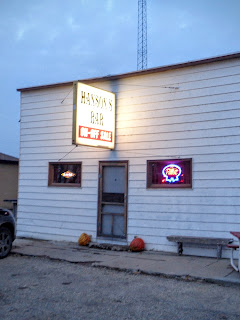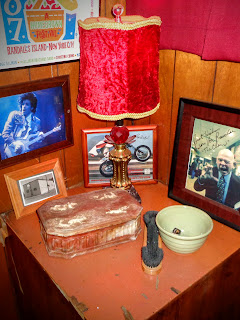“You aren’t from Rugby, are you?” Mark, one of the owners, asked. He had been outside with most of the bar’s customers experimenting with a small pumpkin cannon that wasn’t quite working. Most people assumed we were hunters passing through the area, because that’s who most visitors to Robinson are this time of year. But there was the possibility we could be rivals from the north.
It’s an understandable concern. Hanson’s Bar and the small town of Robinson, North Dakota, are in the midst of a battle of sorts with the city of Rugby, ND. This dispute will probably go on for awhile, since it began decades ago.
Many of us battle to be the center of attention, but this battle is for the right to be known as the center of North America. Hanson’s Bar has evidence for its place on the continent. Right in the middle of the bar floor there’s a sticker that reads, “Geographic Center of North America.” Of course, Rugby has competing evidence: a 21 foot rock obelisk with those same words on a plaque. But Robinson has one thing that Rugby doesn’t have any more -- A trademark from the U.S. government for the title of “Geographic Center.”
Rugby used to have that trademark, which they purchased in 1932. But about twenty years ago, they let the trademark lapse. And this past year Robinson took advantage of that mistake, raised the necessary $350, and bought the trademark for themselves. Of course, the good people of Hanson’s Bar claim there’s more than government paperwork involved in the issue. There’s also “science.”
I talked to Junior, a long time patron of the bar, who said “with global warming and the shift of the polar ice caps the geographic center has shifted south.” That’s what most anyone in the bar will tell you. It’s their story and they’re sticking with it.
This battle for the center has been in the news, and that’s what drew us to Hanson’s Bar. But it’s not the only thing. Hanson’s Facebook page was up to date, and recent posts let us know that the place has a sense of humor -- always an attractive quality.
From the Facebook page, we knew that this weekend is Hanson’s 2nd Annual Giant Pumpkin Contest. According to the page, “Weigh-off will start around 4 or 5 or 6, or whenever we get our s**t together, with destruction via explosion shortly after just south of the bar.” We almost got to see a bit of that explosive action, but the cannon wasn’t quite in working order yet. Mark assured us it would be functioning come Saturday.
Mark said they try to have an event at the bar at least once a month. In July it was a truck and tractor pull, and in February or March there is a Fish Fry to enjoy the haul of local ice fishers. The biggest day may be Danny Hanson Day, celebrating the man who owned the bar until he passed away several years ago. (He was the perfect bartender, we were told, always in a chipper mood. “Everybody knew Danny.”) After his death, the bar closed, but eventually locals put enough money together to buy the building and open the place up again with joint ownership.
Mark is one of those owners, though he insisted he’s just “a visitor because I’ve only been here ten years.” He said he’s just the guy who spins the records. (And he did take obvious delight in his collection of LPs and turntable, changing records frequently and taking requests.)
I asked him our two questions, “What makes for a good bar?” and “What makes for a good church?” and he combined the two answers into one. “It’s all about the people,” he said. “Both are places for people to come together. I don’t consider this a bar; it’s Robinson’s community center. When it rains, people come in from north and south to compare what was in their rain gauges.”
I talked to Junior, who was sitting next to me at the bar. He’s a native to Robinson, and he took over his father’s farm, which he’s worked now for over fifty years. When he graduated from the local high school, there were 67 students in attendance. The elementary school was the last school in town to close; eight years ago, its last year, there were only two students. Any students now must commute to Steele, about twenty miles away.
Junior said he’s seen many farmers in the community go bankrupt over the years. “They see corn prices go up, and they overextend themselves buying property and equipment, and then the prices go down and they can’t make it.” Junior owns his land free and clear and says, “I haven’t got rich, but I’ve done okay.”
I asked Junior what makes for a good bar. He said it was about “the person running it, if he has a good personality. He’ll come and talk to you. I’ve seen bartenders that serve you and then stand in a corner by themselves.” He had good things to say about Mark. “He was out today helping Danny move his barn.”
Junior is a churchgoer, and his answer for what makes for a good church was similar to his answer for what makes for a good bar. “I like a pastor who has a good personality and will have a beer with you. Many won’t.” I asked him why he thought some pastors wouldn’t join in for a drink and he said, “I don’t know, maybe they think the Lord said they shouldn’t.” He spoke well of a Lutheran pastor who “used to come in and drink with us. He was one of the guys and he brought in a lot of young people to the church.”
Mindy asked our two questions of Jay, another farmer at the bar. “I never thought about [what makes for a good bar,] he said. “Probably in small towns, the local characters. This one is probably no different from others. Small ones like this are more like a cafe. Instead of a cup of coffee, you get a can of beer.” As for church, Jay said he hadn’t been to church for quite a few years, even though he belongs to one. He said there weren’t many people at his church, but “they’re strong in the community. They help with money and stuff. Churches like the one we’ve got are good, apart from me not going. It’s just the community. They support the local businesses like the bar, I guess.”
Mark and Jay talked for awhile about ways the bar and the community were intertwined, recalling a number of times when, after a funeral, the family had asked that the bar be opened. Mourners had food at the hall across the street, then gathered at the bar. They told Mindy, “you only see some of your cousins at funerals,” and that old classmates and other people coming in from out of town appreciated a place to gather.
Jay mentioned that it was nice to have the bar as a central point for the area. “You farm, you want to know what’s going on with farms ten miles north. When you farm, what you do when you’re 70, 38, or at 21 is the same. You kind of have the same job. In a small town, ages don’t matter. When you farm, the things you do don’t change. You can relate to all farmers.” He added, “In a small town, you can’t pick your friends. You live here, so you have liking that life in common.”
Mark wasn’t the only person behind the bar. He was pretty much chatting and spinning wax while Courtney was taking care of the drinks. When she had a moment, I asked her what makes for a good bar, “Um, for me, a relaxed atmosphere, good selection, and friendly people.” I asked what made for a good selection and she said, “More than five kinds of beer. And more than beer.”
I asked Courtney what would make for a good church. “Personally, I was raised in the church, but I don’t go anymore. The church kicked me out because I didn’t look right.” (I was momentarily confused by what about Courtney’s appearance would lead to her being ejected from the church. Then I realized it might be her tattoos, and she confirmed that was the case.) “Churches need to understand there’s more than one way to be a Christian.” I asked if there was anything she missed about not being in a church, and she said it was “the sense of community.”
We were about to leave, but then Mark introduced us to two hunters, Rich and Glen from Pennsylvania. We took the opportunity to ask them about bars and churches.
Rich said that what makes for a good bar is “Cold beer, no smoke, and friendly people.” He said that bars back home are trendy now, and for him, “trendy means ‘don’t bother.’” As for church, he looks for friendly people. “I do go to church, but not for the usual reasons. If I didn’t go to church, by Monday I’d be strangling people. The Word has a placating effect.” And he added, “I believe in Jesus,” perhaps unsure if we did as well.
















I lived there.And miss it.God Bless Dan Hanson
ReplyDelete